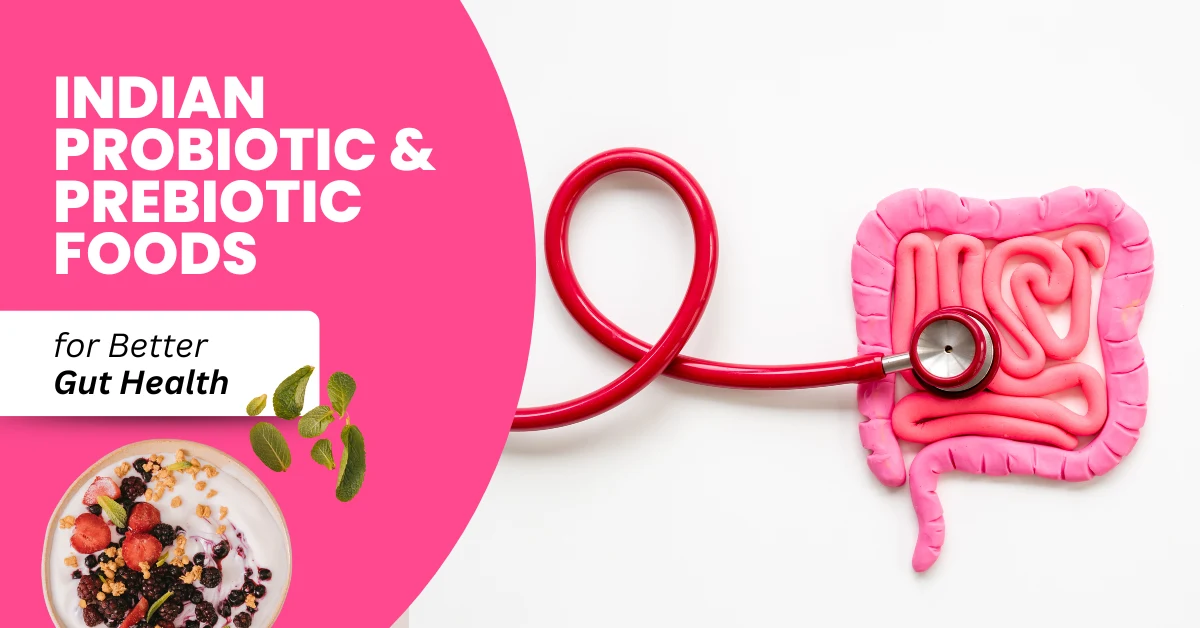A healthy gut is the foundation of good health, and your diet plays a major role in shaping it. From regulating your mood to strengthening your immunity and controlling your weight, your gut microbiome is involved in more functions than you may realize. So, how do you nourish it the right way?
Enter probiotic and prebiotic foods, your gut’s best friends.
In this blog, we’ll explore some of the best Indian probiotic and prebiotic foods that can naturally improve gut health. Whether you’re struggling with bloating, constipation, acidity, or weak immunity, these simple additions to your meals can make a world of difference.
What Are Probiotics and Prebiotics?
Let’s clear the confusion first.
Probiotics are live bacteria (the good kind) that help balance your gut microbiota.
Prebiotics are types of dietary fiber that feed the healthy bacteria in your gut.
Think of it this way: probiotics are the friendly soldiers, and prebiotics are the food that helps them stay strong.
When included together in your diet, like a symbiotic team, they support digestion, reduce inflammation, improve nutrient absorption, and enhance immunity.
Why Are They Important for Indians?
Due to our changing diets and increasing reliance on processed, low-fiber, high-sugar foods, many Indians today suffer from gut-related issues like acidity, bloating, IBS, and sluggish metabolism.
Combining traditional Indian fermented foods with fiber-rich, plant-based meals can restore gut balance and naturally fight these issues. In fact, many Indian meals are naturally packed with both probiotics and prebiotics, creating a symbiotic relationship that promotes gut health.
If you’re already focusing on healthy eating, don’t miss our guide on High-Fiber Indian Foods That Burn Fat and Boost Gut Health.
Best Indian Probiotic Foods for Gut Health
- Curd (Dahi)
The most easily available and widely consumed probiotic in Indian homes. Rich in Lactobacillus bacteria, curd soothes the stomach, improves digestion, and boosts calcium absorption. Make sure to consume homemade curd and not the flavored, sweetened ones.
Tip: Eat curd during the day, preferably with lunch, and avoid combining it with fruits.
- Buttermilk (Chaas)
A summer staple in many Indian households, chaas not only cools your body but also replenishes gut-friendly bacteria. It contains probiotics and digestive enzymes that ease acidity and bloating.
Tip: Add roasted jeera, black salt, and mint for an even healthier twist.
- Kanji (Fermented Carrot Drink)
Kanji is a naturally fermented North Indian drink made with black carrots, mustard seeds, and water. It ferments over a few days and becomes a gut-healing tonic. This tangy drink is loaded with live cultures and antioxidants. - Idli and Dosa Batter
The fermentation process involved in making idli or dosa batter creates beneficial lactic acid bacteria. While the heat of cooking may kill some live cultures, regularly consuming fermented batters still helps support digestive health.
Tip: Prefer using traditional rice and urad dal ratios and allowing natural fermentation for 12–16 hours.
Best Indian Prebiotic Foods to Add to Your Plate
- Raw Banana (Kacha Kela)
Raw banana is rich in resistant starch, a type of prebiotic that nourishes gut bacteria. It also improves insulin sensitivity and supports fat burning.
Tip: Try making a raw banana sabzi or cutlets instead of always reaching for potatoes.
- Garlic and Onion
These kitchen staples are packed with inulin, a natural prebiotic fiber. They support the growth of bifidobacteria in the gut and improve digestion.
Tip: Cooked or raw, both forms are beneficial. Use them in your dals, curries, or salads.
- Whole Grains like Jowar and Bajra
Traditional Indian millets like jowar, bajra, and ragi are not just rich in fiber, they also provide slow-digesting carbs that act as food for gut microbes.
Tip: They’re especially helpful if you’re trying to manage blood sugar and weight along with digestion.
- Green Banana Flour
This lesser-known ingredient is gaining popularity in gut-friendly recipes. It’s gluten-free, high in resistant starch, and an excellent prebiotic.
Tip: Add a spoonful to your rotis, smoothies, or pancakes.
How to Combine Probiotic & Prebiotic Foods Daily
Here’s a sample gut-friendly Indian meal plan:
| Meal | Food Ideas |
| Breakfast | Idli with coconut chutney (fermented + fiber), or Roti with raw banana sabzi |
| Mid-morning | Buttermilk with roasted jeera and mint |
| Lunch | Brown rice, dal with garlic tadka, sautéed veggies with onion |
| Snack | Kanji or curd with 1 tbsp flaxseed powder |
| Dinner | Bajra khichdi with sautéed vegetables and curd on the side |
FAQs on Indian Probiotic and Prebiotic Foods
1. Can I take curd if I have acidity?
Yes, curd can soothe the gut lining and reduce acidity. But avoid it at night or in cold weather if you’re prone to sinus issues.
2. What’s better — curd or buttermilk?
Both are beneficial. Curd is denser and richer in calcium, while buttermilk is lighter and easier to digest. Choose based on your digestion type.
3. Are store-bought probiotics useful?
Some are, but always check for added sugars or preservatives. Natural, homemade fermented foods are usually safer and more affordable.
4. What if I’m lactose intolerant?
You can go for plant-based fermented foods like kanji or coconut milk yogurt. Also, small amounts of curd may still be digestible as the lactose is partly broken down.
Final Thoughts
Your gut is not just about digestion — it’s your second brain. And in Indian cuisine, we’re lucky to have time-tested, natural options to support gut health.
Start with small changes. Add a spoon of homemade curd to your lunch, replace white rice with jowar or bajra once a week, and enjoy a glass of kanji or chaas with your meals. These small, everyday shifts can transform your digestion, mood, and overall health.
Want more personalized help for bloating, acidity, IBS, or weight gain linked to poor gut health? Book a consultation with our expert nutrition team at Q-Slim Fitness Studio in Mumbai.
You can also explore our Home Page for more wellness and fat loss solutions.

